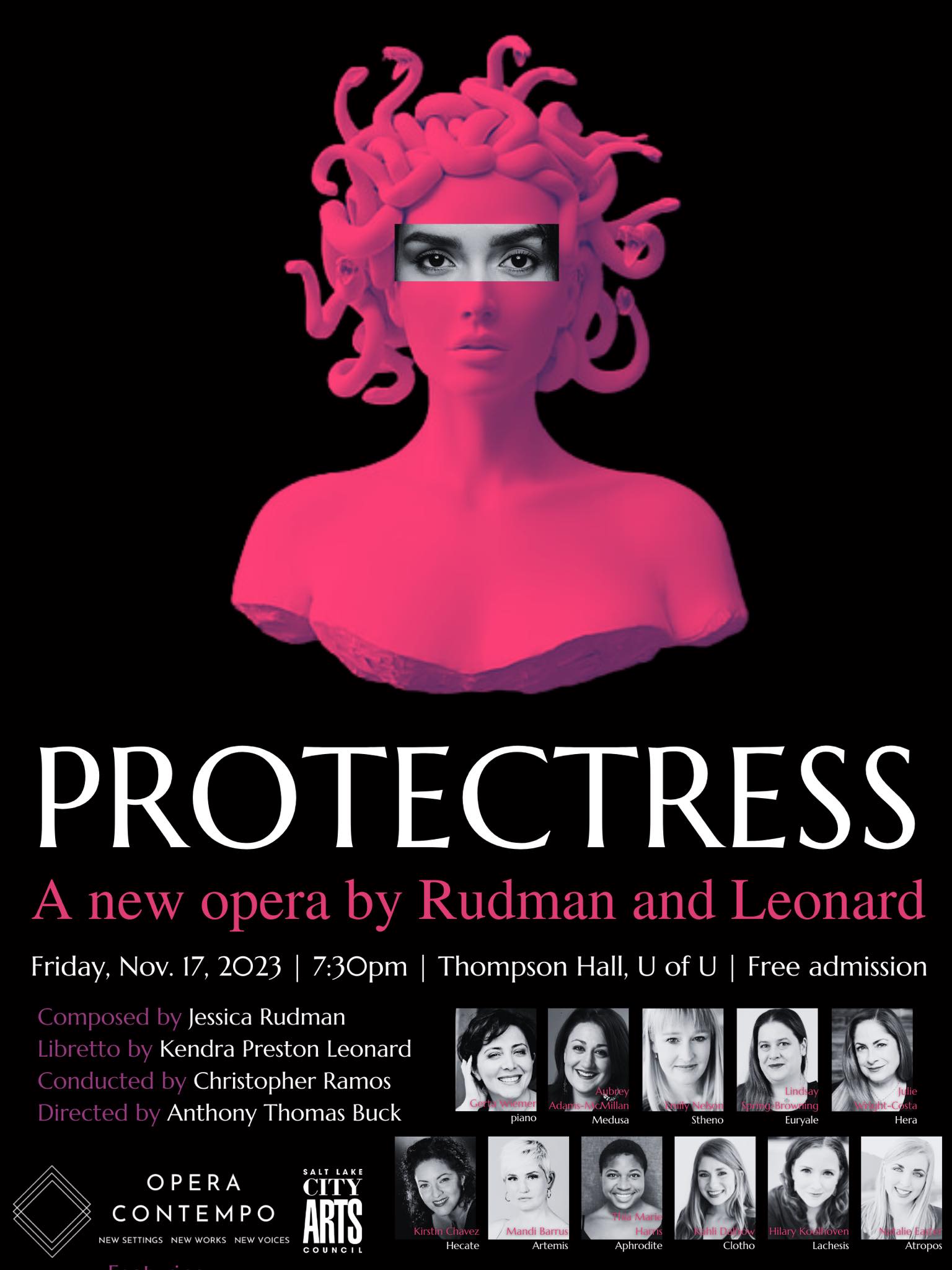SALT LAKE CITY — Protectress (music by Jessica Rudman and libretto by Kendra Preston Leonard) falls into a category of art I am hereby dubbing “Barbie Art:” a piece of art, made by a white woman, that seeks to talk about the experience of being a woman in a way that is very blatant and leaves no room for interrogation or misunderstanding (such as Salt Lake Acting Company’s recent Can I Say Yes To The Dress?). But unlike the film Barbie, a comedy about the patriarchy, Protectress evades the superficial trappings of female empowerment to focus on the actual harm that is inflicted upon women (sometimes by other women) and how this upholds oppressive systems that hurt everyone.

The opera is short piece in development, and at this stage consists of one act with two scenes. In the beginning, Medusa (played by Aubrey Adams-McMillan) is tossing and turning in her bed and wakes up screaming. Her two sisters, Stheno (played by Emily Nelson) and Euryale (played by Lindsay Spring Browning) come to comfort her in the middle of the night. Medusa begins to recount the details of the nightmare (which seem to happen often) and eventually talks about how she was raped by Poseidon in Athena’s temple, but Athena sought to punish her instead.
Everything takes place in a modern setting with ancient Greek details. Stheno has a solo about a lover she had and their dog, and how they took walks in the park, mentions of baseball, magazines and the use of cell phones. But the Gods and magic are real. Leonard is not alone in her choice to make Medusa a contemporary figure. Eurydice (by Sarah Ruhl) is a smart re-imagining of an ancient Greek myth that also partly takes place in the modern era, and so the idea has potential.
Medusa’s ultimate goal is to get Athena to leave her alone and change her ways, and so she and her sisters invite various other goddesses to get their help. Because the play is a reading, everything is really scaled down, but still effective. Hecate (played by Kirstin Chavez) is dressed all in black with a red scarf, while Artemis (played by Mandi Barrus) wears a green track suit with a white t-shirt underneath. The only confusing character is Aphrodite (played by Thia Marie Harris), who arrives with an array of flowers tucked into her natural hair. While this is always a top-tier style for Black women, it made her look closer to Persephone than the goddess of love and beauty.
The core of the opera is revealed when Hera talks about how she had to forget who was previously (by drinking from Lethe, the river of forgetting) so that she could dislodge herself from the violent systems she was apart of. But this is where the writing is missing some connective tissue; this is an opera of ideas, but it some of them do not gel well within a world where the gods are real in modern times. Hera now teaches self-defense and anti-harassment classes and is upset at her part in upholding abusive systems. But, if Athena is supposedly giving Medusa nightmares, and Hecate can make Medusa immortal, why is Hera teaching such rudimentary courses when she is literally the queen of all the gods and she is the patron of women? Shouldn’t she be able to do much more?
The reading also had live piano accompaniment by Gerta Grimci Wiemer that really elevated the work. The score is varied, ranging from people singing in unison to times when multiple people sing at the same time but not together. The Fates (played by Kahli Dalbow, Hilary Koolhoven, and Natalie Easter) have their own solo about how they want to help atone. In the earlier part of the opera, there’s this crescendo of all three Gorgon sisters singing simultaneously that was thrilling. And perhaps it is thanks to the careful directing by Anthony T. Buck, but cutoffs were so perfectly executed that it felt like musical sorcery.
Protectress is an in progress opera where Kendra is actively working on the second act of the show. There are a lot of story elements that need to either be stricken or explained in more detail. After a lot of revisions, perhaps a story told from Medusa’s perspective might work. Ultimately, the opera has to decide if it is a story about gods in modern times or normal women, perhaps named after gods, dealing with human problems. But it can’t be both. Once this distinction is made clear, Protectress will be all the better for it.
[box]Protectress was a one-night event on November 17, 2023. For more information about Opera Contempo productions, visit operacontempo.com.[/box]

